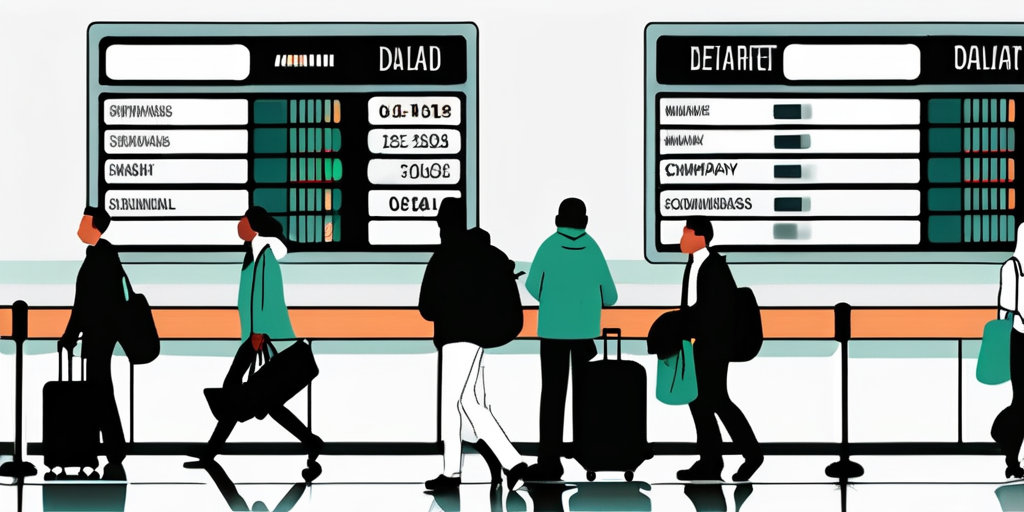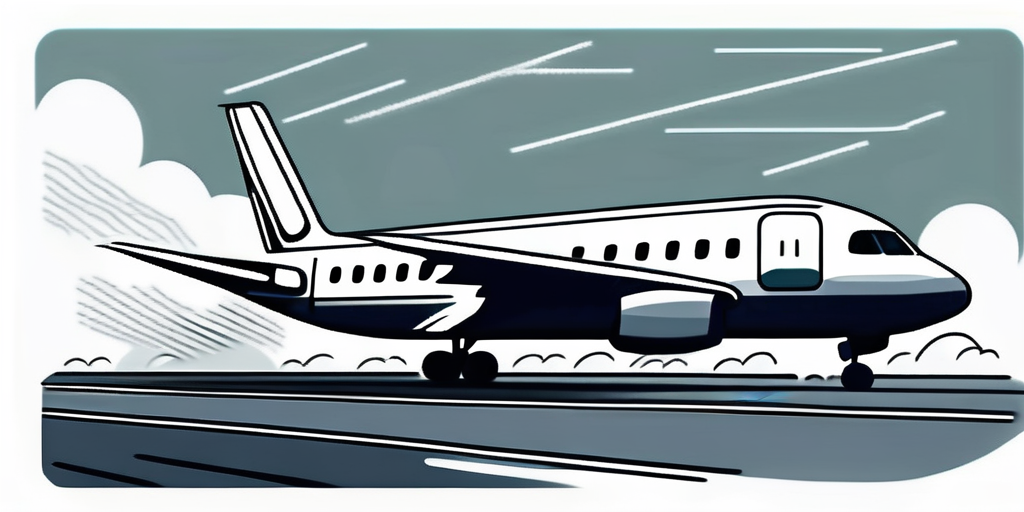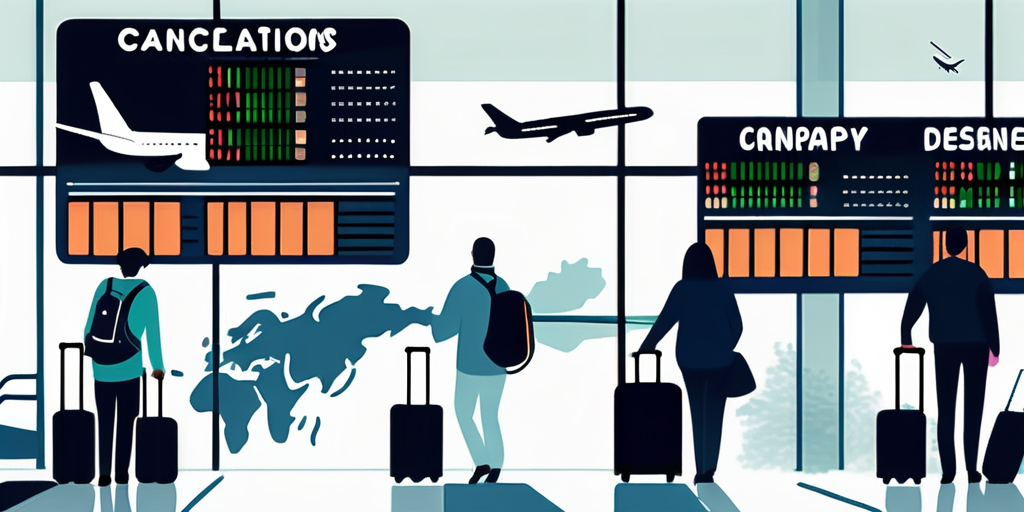How Long Can a Flight Be Delayed Before It Is Cancelled?
Flight delayed? Understand when it might turn into cancellation. Learn the time limits and prepare for potential travel disruptions.
Flight delays can be a major inconvenience for travelers. Whether you're rushing to catch a connecting flight or eagerly waiting to reach your destination, understanding how long a flight can be delayed before it is eventually cancelled is crucial. In this article, we'll delve into the definition of flight delays, explore common causes, and examine the legalities surrounding flight delays and cancellations.
Understanding Flight Delays
The Definition of a Flight Delay
A flight delay occurs when a scheduled departure is postponed beyond its original departure time. Delays can range from a few minutes to several hours, and they can happen due to various factors, including weather conditions, technical issues, or airline operations.

Common Causes of Flight Delays
Weather conditions, or other extraordinary circumstances such as storms, heavy snowfall, or fog, often cause flight delays. These external factors can impact a flight's ability to depart or land safely. Additionally, technical issues with the aircraft, such as mechanical failures or faulty equipment, can lead to delays. Other causes include air traffic congestion, crew availability, and issues with ground operations.
Let's take a closer look at some of the common causes of flight delays. Weather conditions play a significant role in disrupting flight schedules. Thunderstorms, for example, can create strong winds and heavy rain, making it unsafe for planes to take off or land. Similarly, heavy snowfall can cover runways, making them slippery and difficult to navigate. In such cases, airlines have no choice but to delay flights until the weather conditions improve and it is safe to operate.
Technical issues with the aircraft can also contribute to flight delays. Modern airplanes are complex machines with numerous components that need to function properly for a safe flight. If any of these components fail or malfunction, the airline must address the issue before allowing the aircraft to take off. This can involve troubleshooting, repairing or replacing faulty parts, and conducting thorough safety checks. While these measures are necessary for passenger safety, they can result in significant delays.
- Almost 78% of the flights were on time.
- 7.38% of the delay come from the aircraft arriving late.
- 6.78% of the delays come from the air carrier.
- 5.22% is due to a national aviation system delay.
- Weather issues only represent 0.68% of the delays in the US.
- 1.29% of the flights were cancelled
- 0.24% of the flights were diverted
- 0.06% of the national flight delay is due to the security.
The Legalities of Flight Delays and Cancellations
Airline Policies on Flight Delays
Each airline has its own policies regarding flight delays. Some airlines may provide passengers with compensation if a delay exceeds a certain period of time, while others may offer alternative transportation or accommodation. It's important to familiarize yourself with your airline's policies to know what to expect in case of a delay.
Let's take a closer look at some of the common policies that airlines may have in place for flight delays. In situations where a delay is within the airline's control, such as mechanical issues or crew scheduling problems, many airlines will offer compensation to passengers. This compensation can range from meal vouchers or hotel accommodations to monetary compensation, depending on the length of the delay and the airline's specific policy.
For example, some airlines may provide passengers with meal vouchers if the delay exceeds a certain number of hours. This can be a welcome relief for travelers who find themselves stuck at the airport for an extended period of time. Other airlines may go a step further and offer hotel accommodations for overnight delays, ensuring that passengers have a comfortable place to rest until their flight departs.
How long does a flight have to be delayed for compensation?
You need to arrive at your final destination at least 3 hours late to claim a compensation for your delayed flight.
Note that it's the delay at arrival that matters (not the delay at departure): for example, if your flight departed 3h15 late, but caught up on the delay during the flight and arrived "only" 2h58 late, then you are not eligible to a compensation.
If your journey includes a connection and the first flight is delayed but you still arrive at your final destination less than 3 hours late, you are not entitled to a compensation either.
Passenger Rights in Case of Flight Delays
Passenger rights differ between countries, but many jurisdictions have implemented regulations to protect travelers. These regulations often outline the minimum standards for compensation and assistance that passengers are entitled to in case of flight delays. It's wise to know your rights as a passenger and seek appropriate recourse if necessary.
Let's delve deeper into some of the common passenger rights that may be applicable in case of flight delays. In the European Union, for example, the EU Regulation 261/2004 provides certain rights to passengers in the event of flight delays or cancellations. According to this regulation, if a flight is delayed for more than three hours, passengers may be entitled to compensation ranging from €250 to €600, depending on the distance of the flight and the length of the delay.
Furthermore, this regulation also stipulates that airlines must provide assistance to passengers during the delay, such as meals and refreshments, access to communication facilities, and, if necessary, hotel accommodations. These provisions aim to ensure that passengers are not left stranded without basic necessities in case of a flight delay.
It's important to note that passenger rights may vary depending on the specific circumstances of the delay, such as whether it was within the airline's control or due to extraordinary circumstances like weather conditions or air traffic control restrictions. Understanding your rights as a passenger can empower you to take appropriate action if you believe your rights have been violated.
Factors Determining Flight Cancellation
Flight cancellations due to delays can be a frustrating experience for air travelers, disrupting their plans and causing inconvenience. When delays extend beyond a certain threshold, airlines may decide to cancel flights altogether rather than continue to delay them further.
Check our Ultimate Guide on Flight Cancellation and know your passenger rights.
Weather Conditions and Flight Cancellation
Severe weather conditions, such as hurricanes or blizzards, can force airlines to cancel flights for safety reasons. While airlines strive to minimize cancellations, prioritizing passenger safety is paramount. In such cases, airlines may offer alternatives, such as rescheduling or refunding affected passengers.

When it comes to weather-related flight cancellations, airlines closely monitor forecasts and work in collaboration with meteorological experts to make informed decisions. The safety of passengers and crew is always the top priority, and airlines take into account factors such as wind speed, visibility, and the severity and duration of the weather event. This careful evaluation ensures that flights are not only canceled when necessary, but also that passengers are provided with the most accurate and up-to-date information regarding their travel plans.
Technical Issues Leading to Cancellation
Technical issues with the aircraft can also result in flight cancellations. Airlines prioritize the safety and airworthiness of their fleet, and if a mechanical problem is identified, it may be necessary to cancel the flight. In these situations, passengers should be provided with alternative travel arrangements or compensation.
When it comes to technical issues, airlines have rigorous maintenance and inspection procedures in place to ensure the safety of their aircraft. Regular checks, routine maintenance, and adherence to strict industry standards are all part of the comprehensive approach taken by airlines to prevent technical issues from arising. However, despite these precautions, unforeseen circumstances can occur, and if a problem is detected before takeoff, the airline must prioritize passenger safety by canceling the flight.
It is important to note that airlines have dedicated teams of highly trained professionals who work tirelessly to address technical issues promptly. These professionals meticulously assess the situation, determine the root cause of the problem, and take the necessary steps to rectify it. This thorough process ensures that the aircraft is safe for operation and minimizes the risk of potential incidents during the flight.
How Airlines Manage Delayed and Cancelled Flights
Communication During Flight Delays
Airlines understand the frustration caused by delays and strive to keep passengers informed about the status of their flight. Communication channels can include text messages, email notifications, flight information screens, or announcements at the airport. Timely and transparent communication is key in managing passenger expectations.
During flight delays, airlines have dedicated teams that work tirelessly to provide updates and information to passengers. These teams are equipped with the latest technology and systems that allow them to monitor the progress of the delayed flight, assess the situation, and communicate any changes or developments to passengers promptly. They understand that passengers rely on accurate and timely information to make informed decisions and plan accordingly.
By turning on the notifications from your smartphone, you'll be able to keep being informed of any situation.
In addition to digital communication channels, airlines also have staff members stationed at the airport who are trained to handle passenger inquiries and provide real-time updates. These staff members are there to assist passengers, answer questions, and address any concerns they may have. They play a crucial role in ensuring that passengers feel supported and informed throughout the delay.
Compensation and Accommodation for Delayed Passengers
When flights are significantly delayed or cancelled, airlines may offer compensation or assistance to affected passengers. Depending on the circumstances and local regulations, this could include providing meals, transportation, accommodation, or reimbursement for additional expenses incurred due to the delay. It's important to know your rights and communicate with the airline if you believe you are entitled to compensation.
Airlines have well-defined policies and procedures in place to handle compensation and accommodation for delayed passengers. These policies are designed to ensure that passengers are treated fairly and receive the necessary support during their travel disruptions. In cases where the delay is within the airline's control, such as mechanical issues or crew scheduling problems, passengers may be eligible for compensation in the form of vouchers, travel credits, or even cash reimbursement.
Furthermore, airlines understand that flight delays can disrupt passengers' travel plans and cause inconvenience. To minimize the impact, they may offer assistance with rebooking onto alternative flights, arranging hotel accommodations, or providing transportation to and from the airport. These measures are aimed at alleviating the stress and inconvenience caused by the delay, and ensuring that passengers are taken care of throughout their journey.
- Your flight needs to be delayed by at least 5 hours at departure to be eligible for a flight delay refund.
- Your flight must be delayed by at least 3 hours at arrival to be eligible for flight delay compensation.
- For a delay at departure of at least 2 hours, the airline must provide you with a meal (or meal voucher), refreshments, access to wi-fi, and 2 phone calls.
- For a significant delay at departure (5 hours or more), the airline must provide you with a hotel room and transportation between the hotel and the airport.
Tips to Handle Flight Delays and Cancellations
Preparing for Potential Delays
While flight delays and cancellations are beyond passengers' control, being prepared can help alleviate some of the stress. Pack essential items in your carry-on bag, such as a change of clothes, toiletries, and any necessary medication. Additionally, consider purchasing travel insurance to protect yourself from unexpected expenses.

Steps to Take When Your Flight Is Delayed or Cancelled
If your flight is delayed or cancelled, remain calm and follow these steps:1. Contact your airline immediately to understand the reason for the delay or cancellation and to explore alternative options.
2. Stay updated on the status of your flight through airline announcements or updates from airport staff.
3. Keep all relevant documents, such as your ticket, boarding pass, and receipts for expenses related to the delay.
4. If necessary, seek assistance from airline staff or airport customer service representatives for further guidance.
Remember, it's important to remain flexible and patient during these situations, as airlines strive to resolve issues and get passengers to their destinations as soon as possible.
In conclusion, the duration of a flight delay before it is ultimately cancelled can vary depending on numerous factors. Weather conditions, technical issues, and other operational considerations play a significant role in determining delays and cancellations. It is essential to understand your rights as a passenger and familiarize yourself with the airline's policies in case of a delay or cancellation. By being prepared and knowing the necessary steps to take, you can navigate flight disruptions more effectively and minimize the impact on your travel plans.
Ready to Claim Your Flight Delay Compensation?
The moral of the story? Use ClaimCompass and our flight delay compensation calculator.
We're not just another pretty interface; we actually know our stuff, and we make the process easier than packing a carry-on (seriously, how does anyone decide what goes in there?).
You don’t have to submit a claim if you don’t want to: you can simply use the flight delay compensation calculator to check whether you’re entitled to compensation as well as the compensation amount, then decide whether to claim compensation yourself or with us.
How long does my flight have to be delayed for compensation?
The duration for flight delay compensation varies depending on factors such as the airline, flight distance, and regulations in the departure and arrival locations. In general:
- For flights departing from or arriving at European Union (EU) airports on EU carriers, compensation under EU Regulation 261/2004 typically begins for delays exceeding 3 hours, with some exceptions for shorter delays in specific circumstances.
- Outside the EU, compensation policies may vary by airline and jurisdiction. Some airlines may offer compensation for delays exceeding 2 or 3 hours, while others may have different criteria.
It's advisable for passengers to check the specific policies of the airline they are flying with and any relevant regulations governing their flight's departure and arrival locations to understand the eligibility criteria for compensation in case of a delay.
How long can an airline delay a flight?
While there is no universal rule dictating how long an airline can delay a flight, there are commonly referenced thresholds that passengers often associate with eligibility for compensation or assistance. These thresholds are often based on regulations such as EU Regulation 261/2004 or similar laws in other jurisdictions. Here's a breakdown:
- Domestic Flights: For domestic flights, passengers may become eligible for compensation or assistance after a delay of typically 3 hours or more, depending on the specific regulations in the country of departure. This threshold is often cited in reference to regulations governing passenger rights and airline obligations in cases of flight delays.
- International Flights: For international flights, the threshold for eligibility for compensation or assistance may be slightly longer, often cited as 4 hours or more of delay. This extended threshold reflects the potentially greater impact of delays on passengers traveling longer distances and across international borders.
Can I get compensation for a delayed flight?
Yes, they do. To be eligible, however, the airline must be responsible for the delay.
If the flight was disrupted because of extraordinary circumstances, such as air traffic control restrictions, adverse weather conditions, or security risks at the airport, then the airline is not obligated to compensate passengers.
When am I not entitled to flight compensation?
In short, if the cause of the flight delay is beyond the airline's control, you’re not entitled to compensation. When it’s the airline’s fault, you are entitled to compensation
In cases of extraordinary circumstances like bad weather conditions, air traffic control restrictions, security risks, or technical issues that aren’t the airline’s fault, EC261 rules that the airline doesn’t have to pay.
